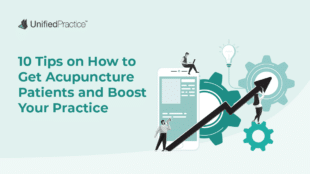The mere mention of Electronic Health Records (EHRs) can leave some practitioners feeling overwhelmed. As with any new technology, concerns abound. Some can’t shake the fear of feeding data to “big brother,” others worry that EHRs will get in the way of patients talking to their doctors. When you ask acupuncturists, many aren’t familiar with EHRs or what these programs do. It can be harder to find the benefits, despite their increased use throughout the medical community. This is particularly unfortunate given the potential for EHRs to simplify the day-to-day operations of an acupuncture clinic. Practice management software that is specific to the practice of acupuncture and herbal medicine like Unified Practice will help your clinic thrive in the ever-changing healthcare environment.
When examining the benefits of EHRs, there are three main areas where these programs provide a benefit to an acupuncture practice: practice management, practitioner communication, and improvements in patient care.
Practice Management
When looking at practice management, the most effective EHRs help to streamline operations by having appointment booking, billing, and exam/ treatment record all in one place. One advantage Unified Practice has over other acupuncture practice management software is that the treatment record is included, making insurance billing much more straightforward. Having booking, billing, and treatment information all together in the same program allows for improved analysis of business data and more coordinated in-house marketing. Switching to EHRs also reduces the use of paper, leading to cost savings, increased space, and no loss of important papers. An EHR can be the cornerstone of a “Green” acupuncture practice.
Practitioner Communication
Practitioner communication is also improved with the use of EHRs. When all of the information is typed, there are no issues with legibility and future interpretation of records. For example, in clinics with multiple practitioners, the sharing and reading of records can be very easy, leading to more continuity between treatments with the help of Unified Practice. If an acupuncturist works at multiple locations, the records are available at each location, allowing for greater access and the ability to work on reports at any time. Sharing records between clinics, such as sending exam/ treatment information to doctors, chiropractors, physical therapists, etc. is also easily facilitated by some EHRs. This results in greater coordination of care for patients, both in an acupuncture clinic and between various patient providers.
Improvements in Patient Care
Finally, EHRs are linked to improvements in the quality of patient care. EHRs provide practitioners with a range of prompts and information that allow for more thorough exams. In some acupuncture EHRs, such as Unified Practice, reference material is available in the software, allowing for quick access as needed.
With improved communication between all treating physicians, EHRs provide enhanced coordination of care: labs ordered by different providers are accessible; previous diagnostics are cataloged; and all treatment notes are searchable. This coordination saves the patient from repeated labs and exams (saving time, money, and stress) while allowing providers to see the complete range of treatment the patient has received. The advantages of electronic health records are numerous and affect multiple areas of clinical practice. Acupuncturists should consider selecting a program that offers these benefits while supporting the unique needs for acupuncture practice management.
Author: Thomas Meade




